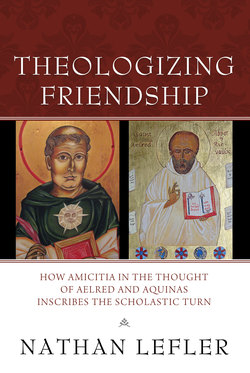Оглавление
Nathan Sumner Lefler. Theologizing Friendship
Theologizing Friendship
Foreword
Preface
Acknowledgments
Abbreviations
Introduction
1. Differences between the More Experiential Approach of Monastic Theology and the More Conceptual Approach of Scholastic Theology
2. The Theological Account. of Friendship in Aelred of Rievaulx
3. The Theological Account. of Friendship in Thomas Aquinas
4. Aelred and Thomas Compared
Selected Bibliography
Отрывок из книги
To three friends,
Aelred, Thomas, and Annie,
.....
Aelred of Rievaulx is ideally suited to represent the monastic theological enterprise, as an outstanding example, but one nonetheless typical, of monastic life and thought throughout the ages. Thus, Amédée Hallier speaks in general terms of the “penetrating originality of Aelred’s theology.”117 In a more specific delineation of Aelred’s theological contribution, Charles Dumont observes that it was Aelred who took Bernard’s synthesis of “the spiritual doctrine of the school of charity” and gave its principles “a new attractiveness by a pedagogical and even systematic application, particularly in the practice of meditation on the Gospels.”118 Commenting on Aelred’s longest and most significant work, SC, Aelred Squire asserts that Aelred arrived through his reflections “at a valuable, original insight. At least there appears to be no other patristic or medieval writer who explores these matters quite in Aelred’s way.”119 Furthermore, referring to the same work, Dumont contends that “Aelred’s scriptural argumentation is remarkable enough to be considered unique, both in its scope and in its precision.”120
On the other hand, Dumont also reminds us that Aelred “had never attended the schools and so received his formation in both theology and monastic life at the same time within the monastic tradition.”121 Aelred differed, then, from Lanfranc and St. Bruno, both of whom turned aside from established academic careers in favor of monachism. Rather, Aelred’s entire spiritual and intellectual formation was thoroughly monastic. Consequently, while many of his writings are of exceptional quality, they are in kind precisely the sorts of works to be found ubiquitously in the medieval monastic milieu: histories, hagiographies, prayers, a De Anima, a Speculum, liturgical sermons. So, too, his skill as a biblical exegete should not divert us from recognizing the sources for his basic principles of interpretation.122 These are, first, the patristic tradition, and second, the virtually ceaseless practice of lectio divina: both integral elements of the common patrimony of European monasticism. In short, Aelred of Rievaulx is a true monk, and while the quality of his thought in its own right justifies scholarly attention, that thought always possesses a genuinely monastic character. So, too, Aelred’s thinking and writing about friendship, for all their universal worth and application, are stamped indelibly with the spirit of the cloister.123
.....
